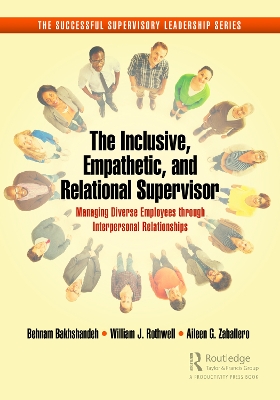The Agile and Empathetic Supervisory Leader
2 total works
Successful Supervisory Leadership
by William J. Rothwell, Behnam Bakhshandeh, and Aileen Zaballero
Why Study Supervision?
This book presents two compelling reasons to study supervision and supervisory leadership:
-
- Influential Position: Supervisors exert considerable influence on organizational settings. Supervisors have been schooled, developed, and trained for their responsibilities. They can function more effectively than if they learn through informal, sometimes haphazard means. It thus pays to learn about supervision because supervisors can influence how efficiently and effectively their organization functions.
-
- Career Path: Many career paths lead to supervision. Supervisors are everywhere. Supervisors are teachers, doctors, accountants, lawyers, plumbers, and electricians. If you aspire to advance within your occupation, you may find that one career path leads to supervision. Preparing for supervisory responsibilities can prepare you for advancement. You may thus have a personal stake – your own future – in learning about what supervisors do and how they do it.
In addition, this book:
- Provides strategies for building solid relationships with team members.
- Uses positivity as a foundational practice to lead and encourage other employees.
- Provides guidelines on how to hold employees accountable and set high expectations.
- Presents strategies to engage, coach, and develop employees by creating a positive
- environment to influence attitudes and behaviors.
- Offers various approaches for managing time and increasing productivity.
The Inclusive, Empathetic, and Relational Supervisor
by Behnam Bakhshandeh, William Rothwell, and Aileen G. Zaballero
Supervisors are the bridge between line employees and middle/upper management. Therefore, they must effectively communicate across the organization to be responsive and thoughtful leaders. With work being more global, organizations are taking advantage of remote work, and the workforce is now more diverse and decentralized, making the workplace more dynamic and complex. However, diversity can be one of the most controversial and least understood business topics because of the issues regarding quality, leadership, and ethics (Anand & Winters, 2008).
An inclusive supervisor will ensure that their direct reports are treated fairly and respectfully but never made to feel less than anyone else. They will be a critical success factor in supporting the business case for diversity, equity, inclusion, and belonging (DEI&B) as a critical strategy in a globally competitive market.
This book builds on the belief that people are the most valuable resource and that everyone should be treated with dignity and respect. The authors will provide tools to self-assess intrapersonal/interpersonal communication, develop a positive work environment, and evaluate listening skills.
A list of competencies to be an effective communicator will be provided. Key concepts such as cross-cultural competence, generational cohort, critical race theory, emotional intelligence, emotional contagion, social exchange theory, and interpersonal competency will be explored.
This book provides strategies for building solid relationships with team members; uses positivity as a foundational practice to lead and encourage other employees; provides guidelines on how to hold employees accountable and set high expectations; presents strategies to engage, coach, and develop employees by creating a positive environment to influence attitudes and behaviors; and offers various approaches for managing time and increasing productivity.

